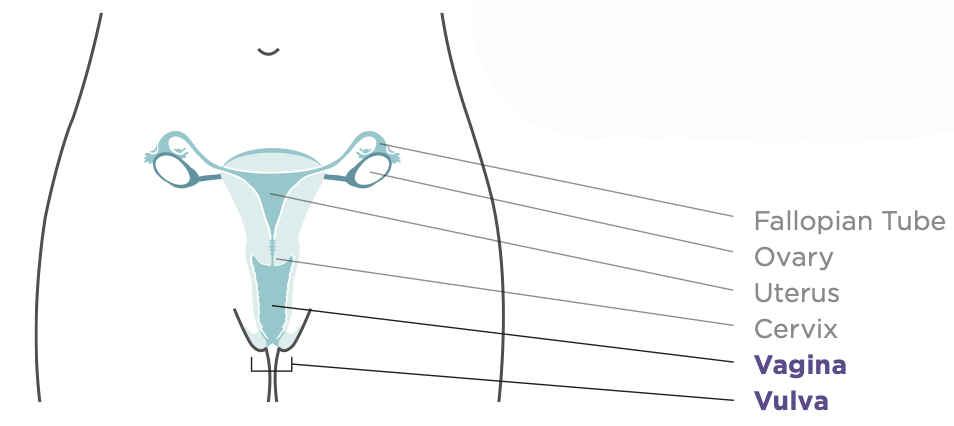
What are vaginal and vulvar cancers?
Cancer is a disease in which cells in the body grow out of control. Cancer is always named for the part of the body where it starts, even if it spreads to other body parts later. When cancer starts in the vagina, it is called vaginal cancer. The vagina, also called the birth canal is the hollow, tube-like channel between the bottom of the uterus and the outside of the body. When cancer forms in the vulva. it is vulvar cancer. The vulva is the outer part of the female genital organs. It has two folds of skin, called the labia. Vulvar cancer most often occurs on the inner edges of the labia. When vaginal and vulvar cancers are found early, treatment is most effective.

Who gets vaginal and vulvar cancers?
While all women are at risk for these cancers, few will get them. Vaginal and vulvar cancers are very rare. Together, they account for 6-7 percent of all gynecologic cancers diagnosed in the U.S., with an estimated 1,300 women diagnosed with vaginal cancer and 4,900 women with vulvar cancer each year.
Are there tests that can find vaginal and vulvar cancers early?
The best ways to find vaginal and vulvar cancers early are to get regular checkups and to see a doctor if you have any signs or symptoms, such as lumps or changes in the vagina or vulva. The doctor may perform tests or other procedures to find out what is causing these symptoms. Your doctor also may recommend more follow-up tests or more frequent exams to check for vaginal or vulvar cancers if you have had abnormal Pap test results or a history of cervical cancer. These things may place you at a higher risk of getting HPV-associated cancers, like vaginal, vulvar, and cervical cancers. It is important to note that the Pap test does not screen for vaginal and vulvar cancers. The only cancer the Pap test screens for is cervical cancer.
What are the signs and symptoms of vaginal and vulvar cancers?
Most vaginal cancers do not cause signs or symptoms early on. When vaginal cancer does cause symptoms, they may include:
• Vaginal discharge or bleeding that is not normal for you. The bleeding may be abnormal because of how heavy it is, or when it happens, such as bleeding after you have gone through menopause; bleeding between periods; or any other bleeding that is longer or heavier than is normal for you.
• A change in bathroom habits, such as having blood in the stool or urine; having more frequent or urgent need to urinate; or feeling constipated. Vulvar cancers often cause signs or symptoms including one or more of the following:
-
- Itching, burning, pain or tenderness on the vulva that does not go away.
- Changes in vulva skin color, where it is redder or whiter than normal for you.
- Changes on the vulva skin, such as a rash, warts, sores, lumps or ulcers.Pay attention to your body, and know what is normal for you. If you have vaginal bleeding that is not normal for you, see a doctor right away. If you have any of the other signs that may be associated with vaginal or vulvar cancer, and they last for two weeks or longer, see a doctor. These symptoms may be caused by something other than cancer, but the only way to know is to see your doctor.
Can the HPV vaccine prevent vaginal and vulvar cancers?
Many vaginal and vulvar cancers are caused by the human papillomavirus (HPV), a common virus that is passed from one person to another during sex.
There is a vaccine that protects against the types of HPV that most often cause cervical, vaginal, and vulvar cancers. It is recommended for preteens (both boys and girls) aged 11 to 12 years, but can be given as early as age 9 and until age 26. The vaccine is given in a series of either two or three shots, depending on age. If you or someone you care about is in this age range, talk with a doctor or other health professional about it.
To learn more about the HPV vaccine visit www.cdc.gov/hpv/ index.html.
What raises a woman’s chance of getting vaginal or vulvar cancer?
There is no way to know for sure if you will get vaginal or vulvar cancer. Some women get these cancers without being at high risk. However, the following factors may increase a woman’s risk for vaginal or vulvar cancer:
• Having HPV.
• Having had cervical pre-cancer or cervical cancer.
• Having a condition (such as HIV, the virus that can lead to AIDS) that makes it hard for your body to fight off health problems.
• Smoking.
• Having ongoing vulvar itching or burning.
If one or more of these things is true for you, it does not mean you will get vaginal or vulvar cancer. But you should speak with your doctor to see if he or she recommends more frequent exams.
How can I prevent vaginal and vulvar cancers?
• Get the HPV vaccine. It protects against the types of HPV that most often cause cervical, vaginal, and vulvar cancers. If you are
between the ages of 9 and 26, talk to your doctor about the HPV vaccine.
• Take steps to reduce your risk of getting HPV or HIV, such as avoiding sex or limiting your number of sexual partners.
• Don’t smoke
